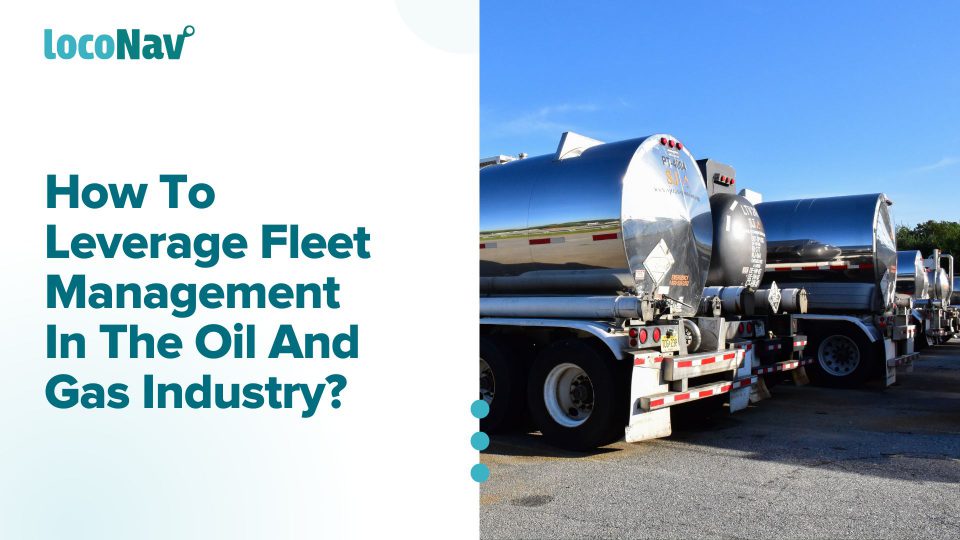

Vehicle fleets in the oil and gas industry face unique issues not seen in other modes of transportation. The petroleum products that oil and gas trucks frequently transport can be inherently dangerous, necessitating extra vigilance and safety.
However, oil and gas fleets do more than only transport products; many fleets also assist in the transportation of extracting supplies such as tubes, pumps, sand, and other assets to drilling sites so that extraction may proceed smoothly and on time.
To reach production targets and limit income lost due to delays, oil and gas firms must maximise efficiency and safety. These businesses are always looking for ways to enhance their day-to-day operations.
In this blog, we will discuss the challenges faced by an oil and gas fleet and how oil and gas fleet management can benefit the industry.
Manage your fleet efficiently with LocoNav’s Oil and Gas Fleet Management Solutions!
3 Common Challenges Faced By an Oil and Gas Fleet
Here are some challenges that an oil and gas business commonly faces:
- One of the most significant obstacles to the transportation of oil, gas, and other fuels, fleet industries require sufficient infrastructure. It is critical to developing methods and processes that minimize the danger of spills, leaking, and road accidents.
- Tankers transport extremely fragile items like oil and gases, therefore fleet industries must pay significantly in order to obtain high-quality tankers.
- Another issue that fleet transportation faces are traffic accidents and collisions with other cars on the road.
6 Benefits of LocoNav’s Oil And Gas Fleet Management
While oil and gas fleets have different demands and challenges than other fleets, the features of today’s modern oil and gas fleet management software may provide relevant solutions.
#1 Minimise Fuel Consumption
One of the primary reasons businesses of all sizes chooses LocoNav’s fleet management software is its incredible ability to dramatically cut fuel costs. This platform allows you to analyse fuel use patterns over time. Analyzing the roads and driving trends with an oil and gas fleet management aids in determining the root cause of fuel waste.
- Trip duration
- Idling time
- Number of stops
- Route deviations
- Driving behaviour
#2 Monitor Bad Driving Behavior
An oil-related accident can jeopardise the lives of everyone on the road, including the driver, and can raise an oil and gas company’s fleet costs if the fleet vehicle experiences significant damage.
Employee driving habits substantially influence how a fleet vehicle is managed. A fleet manager obtains total visibility into the behaviour of their fleet drivers by using oil and gas fleet management and can properly monitor:
- Trip start and end times
- Harsh acceleration
- Seat belt violations
- Harsh braking
- Sharp turns
#3 Schedule Regular Maintenance
A vehicle in an oil and gas fleet must constantly be properly maintained. Preventative maintenance procedures and frequent inspections are extremely beneficial, yet an incident can still occur between inspections. The time it takes for a fleet vehicle to undertake an unscheduled service for repair detracts from the everyday operations of oil and gas businesses and their fleet drivers. This also results in an unneeded fleet expense due to an unannounced maintenance operation.
A fleet manager can gather the information that records a vehicle’s performance using LocoNav’s oil and gas fleet management. Certain diagnostics can notify managers when fleet vehicles require services such as an oil change or tyre rotation, as well as provide data on vehicles that require scheduled maintenance.
#4 Reduce Downtime
Downtime in the oil and gas business is prohibitively expensive. Excessive work and restless operation are possibly the biggest causes of downtime in the fleet business. Furthermore, inappropriate driving techniques and inconsistent servicing schedules have a significant impact on its productive operation.
LocoNav’s oil and gas fleet management software can help you save time by monitoring the functioning condition of your vehicles.
- Updating vehicle maintenance schedules
- Recommending better driving practices
- Suggesting a better route map for trips
- Scheduling better trip charts
- Reporting hazardous driving practices
#5 Improve Fleet Safety
Oil and gas products are highly unstable and, if not handled appropriately, can result in serious mishaps. As a result, their movement poses a substantial risk. Any mistake might have disastrous effects. Furthermore, theft is a persistent concern in the oil and gas business. All of these elements necessitate flawless safety, which vehicle tracking systems can provide.
LocoNav offers safety features that include alarm systems, driver ID, and geofencing. Managers may view every activity throughout operations thanks to 24/7 real-time GPS tracking. They are always aware of the exact location of every car, reducing the possibility of theft. In the event of theft, the tracking software can assist in tracking the vehicle’s movement, resulting in its prompt recovery.
#6 Reduce Asset Depreciation
To say that vehicle repairs are expensive is an understatement. Unplanned roadside repairs raise the expense. Unscheduled repairs could cause a profit leak for oil and gas businesses.
Oil and gas fleet management can help bridge these knowledge gaps by acting as an early warning system, alerting fleet management to potential vehicle malfunctions and heavy equipment failures before they occur.
In this way, telematics not only helps to reduce the costs of repairs but also the costs of downtime.
